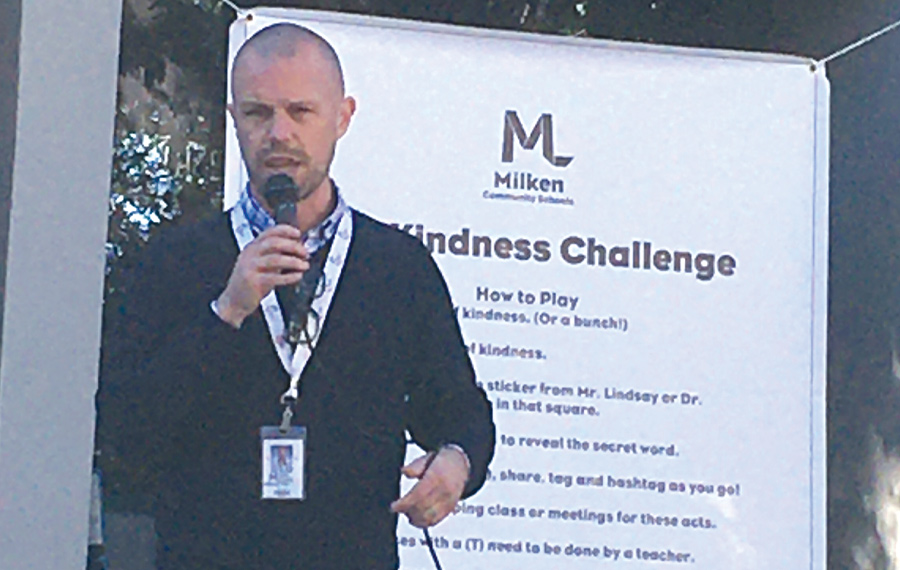 Photo by Leslee Komaiko
Photo by Leslee Komaiko Alongside their basic classes covering subjects ranging from geometry and American history to AP chemistry and art, Milken Community Schools Upper School students also can take a class on positive psychology.
Nick Holton is in his fourth year of teaching the class. When the Michigan native started at Milken a dozen years ago, he taught world history. But he had long wondered how he could best help people become better versions of themselves.
He said his interest was piqued when he was in sixth grade. His little sister was on a soccer team but according to Holton, was “other skilled.” Soccer, however, was Holton’s thing. So one day, in front of their house, he showed his sister a couple of moves. That afternoon, his sister had a great game.
“It gave me the feeling of helping somebody be better at what they wanted to be better at, to go a couple [of] rungs up in terms of their potential,” Holton said. “I think that feeling stuck with me.”
And so, while still teaching at Milken, Holton, went back to school. “It was in my PhD program where I first got exposed to the term eudaemonia: the happiness we experience from being engaged and experiencing personal growth,” he said. “That’s where I really started to think what I’m most interested in is how we cultivate and leverage the world’s greatest resource: human potential.”
“Positive psychology is not just sunshine and rainbows. … It’s the science of thriving … feeling like your best self and functioning as your best self.” — Nick Holton
Holton said he felt confident he could teach positive psychology and that it very much applied to education. After all, he said, positive psychology — which was started by Martin Seligman about 20 years ago — is “not just sunshine and rainbows. … It’s the science of thriving, not just being happy, but crushing it; feeling like your best self and functioning as your best self.”
With the support of the Milken administration, and inspiration from the Geelong Grammar School in Victoria, Australia, and the book they produced, “Positive Education: The Geelong Grammar School Journey,” Holton created a positive psychology curriculum.
Milken junior Talia Byrnes took the class last year before Tiferet, a four-month program in Israel. “I had heard from other kids that time flies [during the program], and that you don’t remember everything,” Byrnes said. She wanted to do whatever she could to mitigate those effects and thought studying positive psychology might help.
“The class was about understanding how the brain has a negative bias and
being able to become aware of the good and appreciate the good in order to counteract the negativity bias we have,” she said. “It’s not a class that is going to make you happy,” she added. Rather, “it gives you the tools to enhance your life in general and appreciate things more.” Among the “tools” Byrnes tried in class was keeping a gratitude journal, something she continued in Israel. “Looking back at that journal, it takes me back to those little things that happened,” she said.
She also practiced mindful eating and meditation as part of the class, finding the latter particularly helpful. And she wrote gratitude letters. “It was one of the most meaningful things I’ve done,” she said.
Shortly after Holton began teaching the class, he heard from parents who also wanted to take the course. So last year he offered a shorter version online and in person for adults, something he has continued during this school year. It’s been popular with current parents and alumni.
Holton is not Jewish but he says positive psychology “happens to really overlap with what I have learned to be a lot of Jewish values,” such as chessed or kindness and gratitude. “We talk a lot about purpose and meaning, the importance of community and relationships,” he said. “The phrase I use every week from “Ethics of the Fathers,” 1:14, is, ‘If I am not for myself, who will be for me?’ But if I am only for myself, who am I?’ You need to fill your cup so you can pour into others.”





















 More news and opinions than at a Shabbat dinner, right in your inbox.
More news and opinions than at a Shabbat dinner, right in your inbox.